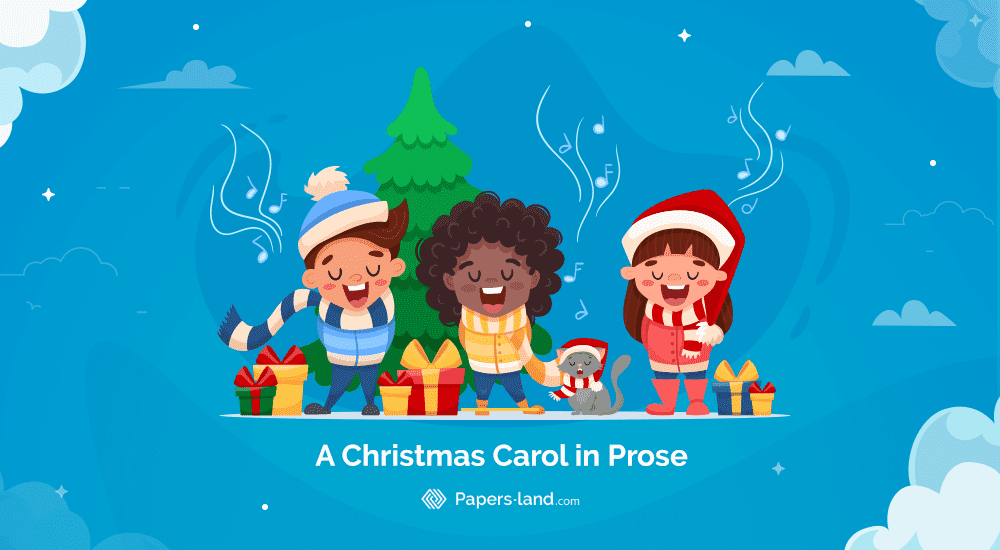


December 10, 2020
Charles Dickens’s novel A Christmas Carol is a typical story of the life of a mean man named Ebenezer Scrooge. Scrooge is not cheery about the idea of spending money despite the fact that it is the Christmas season. He leaves his clerk Bob Cratchit to shudder in isolation simply because he cannot spend money (Dickens 1). He is happy to live the life of a miser. However, Scrooge changes his ways when Marley’s ghost presents visions of past, present, and future to him. Jacob Marley was his partner before he met his death. Indeed, there is a nice quote in one of the lines that Marley was dead: for the start. Marley’s ghost relates his unfortunate ordeal to his culture as a miser. This shocks Scrooge and he makes changes to his life. The distressing circumstances were the humblest children of London survived and worked inspired Dickens to write a novel. Charles Dickens had a desire to respond to the horrible situation and try to change their environment. However, Dickens was unsure of how he could help them. It was the moment that the idea of writing the novel, A Christmas Carol came to his mind (Dickens 2).
Calculate the price
In my opinion, Charles Dickens’s novel exemplifies the ideas of the Victorian age in many ways. The era of the Victorian age took its identity from Queen Victoria. It was an age of development, stability, and social transformations. At the same time, poverty, injustice, and social unrest were also key features of the era.
The Victoria age was evident in strong moral agents. The Victorians rallied for a great code of principles. Personal duty, industry, respect, and kindness were the fundamental principles of the era. These ideals were of equal measure to all classes of the community. The ideal of respect made the difference between the remarkable middle class and the lower class. Charles Dickens’s novel exemplifies these Victorian ideals. This can be seen as a main proponent of the novel as Ebenezer Scrooge transforms from a miser and unkind individual to a generous gentleman. In one of the episodes in the novel, Scrooge claims I shall adore it, as far as I am alive.’ I scarcely ever looked at it before. What a candid expression it has in its appearance! It is a delightful knocker! Here’s Turkey! Hello! Whoop! How are you? Have a Merry Christmas! (Dickens 48). He is excited and generous to offer a turkey for the Christmas party after transforming from the life of a miser. In this episode, Dickens advances the ideals of the Victorian age.
In the Victoria age, respect was a combination of morality, hypocrisy, and conformity to social standards. The concept meant that people possessed good manners, a cool residence with workers and a vehicle, a common presence at church, and philanthropic functions. Philanthropy was also a common practice that took the time of hundreds of Victorians. Dickens’s novel advocates for the recognition of the predicament of the poor. The novel does this through criticism of Scrooge. In one of the episodes, the author thinks about Scrooge Nobody ever begged him in the road to ask, `Scrooge, how do you do? Will you pay me a visit?’ No beggars implored him, no children asked him about time, and not once did somebody ever probe him about a direction to any destination. Even the blind men’s dogs seemed to be familiar to him, and whenever they saw him approaching, they would raise their tails as if they uttered, `There is no eye better than a devils eye, dark principal! (Dickens 3). This excerpt reveals strong criticism against Scrooge’s unkindness and behavior as a miser.
I believe the novel exemplifies the ideals of the Victorian age when it makes a strong expression for social justice. This revelation is clear in the story when the Ghost of Christmas Present cautions Scrooge to be careful with ignorance and Want, as well as powers. The ghost warns him that if is left unimpeded, the powers can trigger disaster for the poor and the whole of humanity. Dickens strains the humanity mutual to all people and stresses that those who have everything should help those who are lacking.
In my opinion, Dickens’s novel exemplifies the Victorian ideals mainly depicting charitable and hospitable customs. It also spreads the value of personal kindness. In a nutshell, the book epitomizes the social morals of the Victorian era. A Christmas Carol recounts the Christian moral principles related to Christmas such as generosity, kindness, and universal love for society. These are the ideals also advanced in the Victorian age.
It is in my strong belief that there are instances in the novel when Dickens expresses anti-Victorian ideals. One of the pillars of the Victoria era was solid patriotism. Civil pride and national identity were among the common ideals among the British during the Victorian era. Issues regarding racial superiority promoted a sense of patriotism. The British had the belief that physical and intellectual differences made the difference among the races of the world. They held the belief that leadership was a preserve of some races. However, the novel is far from this Victorian ideal in the time when the author gives a candid and honest exposure of the mean, hostile culture of the country and the miserable life of the low class. As proof of this unkind and hostile environment of the time, the author thinks that Scrooge does not fancy the idea of incurring costs in Christmas. He says that I wish to be left alone. Inquire from me what I desire, gentlemen that are my reply. I do not make parties at Christmas, and I cannot afford to make idle people parties. I help to support the developments I have mentioned. They cost enough and those who are badly off must go there (Dickens 6). Scrooges’ statement is in relation to his denial to spend cash for the Christmas party. The author overlooks the Victorian ideal of patriotism to expose the unkind and harsh culture of the Scrooge, which is a symbol of some members of the society at the time In addition, the transformation of Scrooge itself is symbolic in relation to the Victorian ideals. The novel recounts Scrooge’s former self, now grown a young man, came briskly in, accompanied by his fellow-Prentice. This was the evidence of the change in the character of Ebenezer Scrooge (Dickens 19).
Dickens also expresses anti-Victorian ideals when his main proponent Ebenezer Scrooge rejects benevolent donations and terminates the poor as “surplus population.” Such pessimistic and hardened denial to share is in contrast to the Victorian ideals which advocate for charity and kindness. Scrooges’ anti-poor attitude is at first a contradiction of the Victorian ideals of respectability. However, the novel revolves to embrace this ideal through the transformation of Ebenezer Scrooge after a series of ghosts visits him.
Check out our professional essay writing service. Here you can get quality help with your paper!
Dickens expresses his anti-Victorian ideals through his failure to criticize capitalism. This is in contrast to the Victorian ideal of social reforms. He deprecates the accomplishment of business merchants but fails to condemn the transaction by which they accumulated their prosperity. The only reproach Dickens brands, in a focus of surprising fictional attention, is that of Ebenezer Scrooge and Jacob Marley due to their lack of generosity from their achievement.
Dickens expresses anti-Victorian ideals at the stage when he takes a narrow view of the community. The novel does not set forth to protect all people in England, but Dickens took an approach of advancing the grievances of the needy people whom he was coming across every day. He did not take into consideration other social classes in the state. It was a sharp disparity to the Victorian ideals of equal treatment of all members of the community. In contrast, Dickens only grants his focus to the low-class populace.
In addition, Dickens also snubs most of the elements of the typical Victorian Christmas of that time when he describes the season. The Victorian ideals embodied a celebratory Christmas full of religious rejoicing. However, Dickens contrasts these ideals in explanations. He is not so much into narrating the “ancient Victorian Christmas” as he is reinstating traditional practices that had a connection with the holidays. The novel also suggests a distinctly contemporary opinion of Christmas. It is less alarmed by serious religious formalities defined by joyous traditions of sharing of gifts, festive celebrations, and displays of prosperity but is rather seen from a political perspective and the plight of the poor.
I believe Dickens relished a considerable amount of cash he received as a writer and speaker. However, he did not let his prosperity to influence his opinion of the world or his relations with others. He held the belief that there should be parity amongst people. He could not comprehend how some people could be so rich while, at the same time, others were dying of hunger (Dickens 44). Dickens explains it is obligatory of individuals that the essence within them should exist among their related men (Dickens 29).
In conclusion, I find the book highly engaging and resourceful. It highlights valid issues of the Victorian age and in a candid manner questions the imprecise aspects of the era. The conversion of Scrooge from the desirous, stingy, and unkind old man into a lavish and virtuous nobleman made the book popular since the novel came out. The bequests of the novel are the expressions “Merry Christmas,” “Bah! Humbug!” and the allusion to an individual as “Scrooge.” Dickens’s work is invaluable to the current society. In addition, the novel achieves its intended effect of making people generous in many ways. Dickens had a desire to inspire reflection on the predicament of the poor in society through his novel. The author also wanted people to examine the quality of their lives. Dickens demonstrates to his audience that anyone can change his or her character, even individuals as mean and acquisitive as Scrooge.